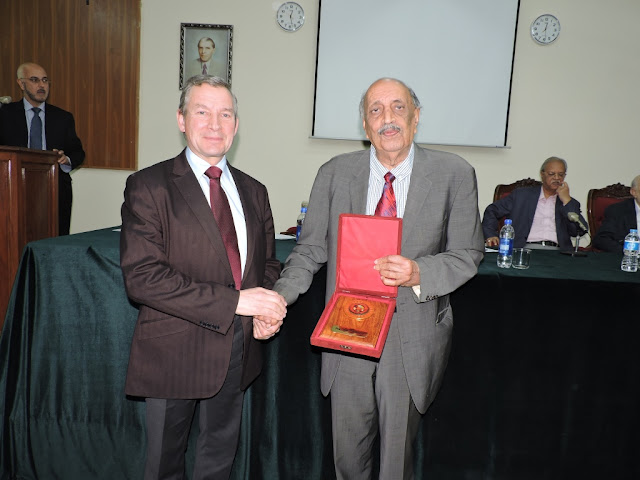Science Cooperation MoU signed between Latvia and Pakistan
A delegation from
Latvian Academy of Sciences is currently on a visit to Pakistan Academy of
Sciences to formalize arrangements for mutual cooperation and collaboration and for building broad based, substantive and
long-term relationship with Pakistan Academy of Sciences in a wide array of Scientific
and technological disciplines. The Memorandum of Understanding (MoU) for
cooperation between Science Academies of the two countries was signed on March 22, 2016 by the President,
Latvian Academy of Sciences, Dr. Ojar SPARITIS and the
President, Pakistan Academy of Sciences, Dr. Anwar Nasim.
Dr. Ojar SPARITIS, President, Latvian Academy of
Sciences apprised the audience that by working on fundamental and applied
sciences with innovative S&T we can stay competitive in the world. He
offered collaboration in all areas of S&T by way of joint projects,
reciprocal visits of scientists, and joint conferences.
Dr.
Anwar Nasim,
President, Pakistan Academy of Sciences, welcomed the offer of support
and collaboration between scientists and scientific institutions of the two
countries and assured the visiting dignitaries from Latvia of all out support
and cooperation from the Pakistani side in this endeavor of national
significance. He shared his eagerness for a productive and mutually beneficial
collaboration for a win-win situation for both the countries. These briefings
were followed by questions and answers and useful discussions.
Secretary General of
PAS, Prof. Zabta K. Shinwari,
briefed the audience about the background and objectives of the Academy. He
said that the Academy has a catalytic role in economic development of the
country by way of promoting S&T by forging and facilitating working
relations between Pakistani and foreign scientific institutions.
Discussing and
elaborating on the possible areas of mutual cooperation, the Chiefs of both the
Academies expressed keen interest and enthusiasm for mutual cooperation in a
wide range of S&T areas. The modus
operandi of collaboration includes joint projects and reciprocal visits of
scientists of the two countries and research of young scientists, and joint
Seminars, Symposia, and Conferences.
The MoU signing ceremony
was attended by senior scientists, young faculty members and postgraduate
students at PAS Headquarters in Islamabad.






